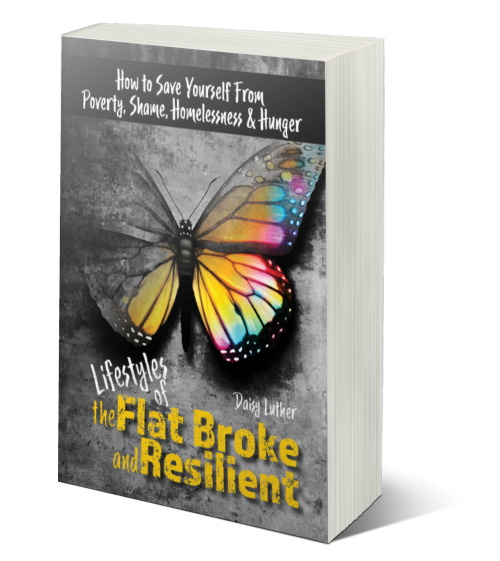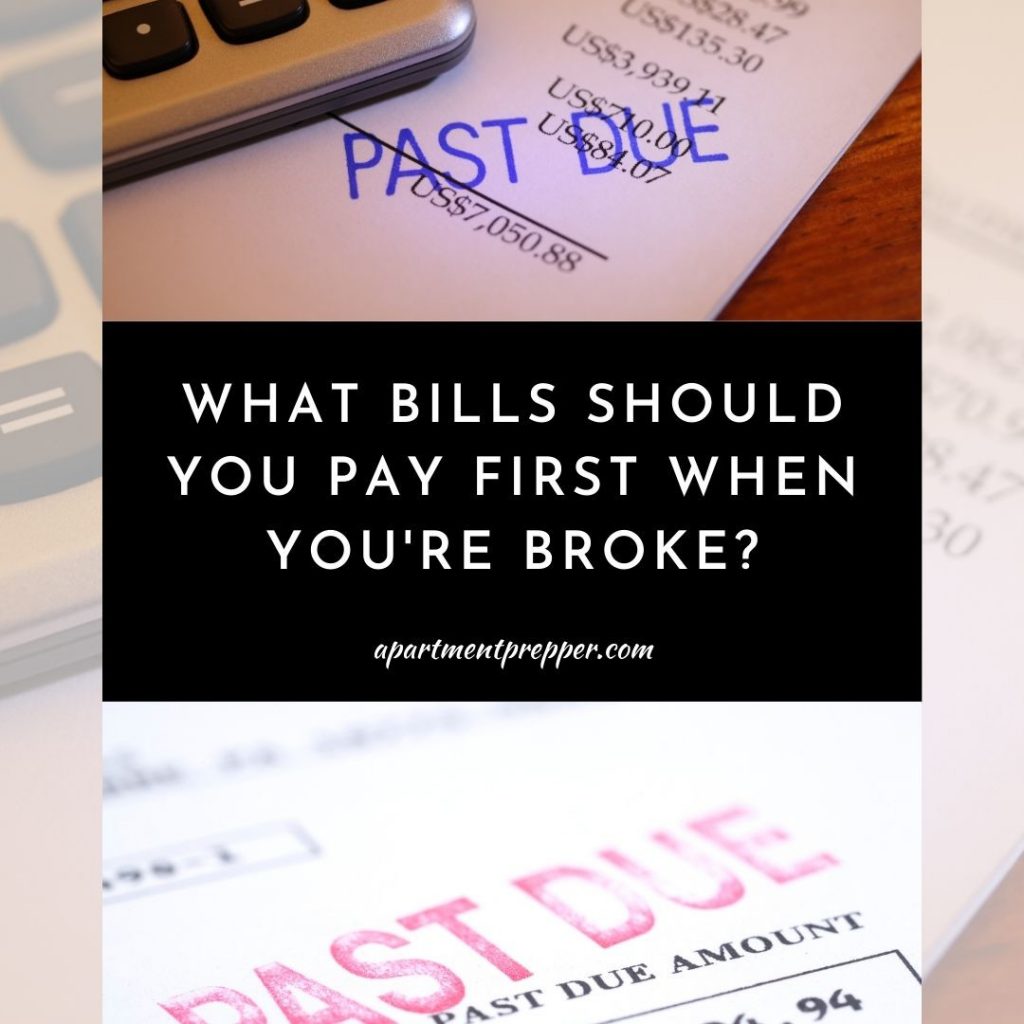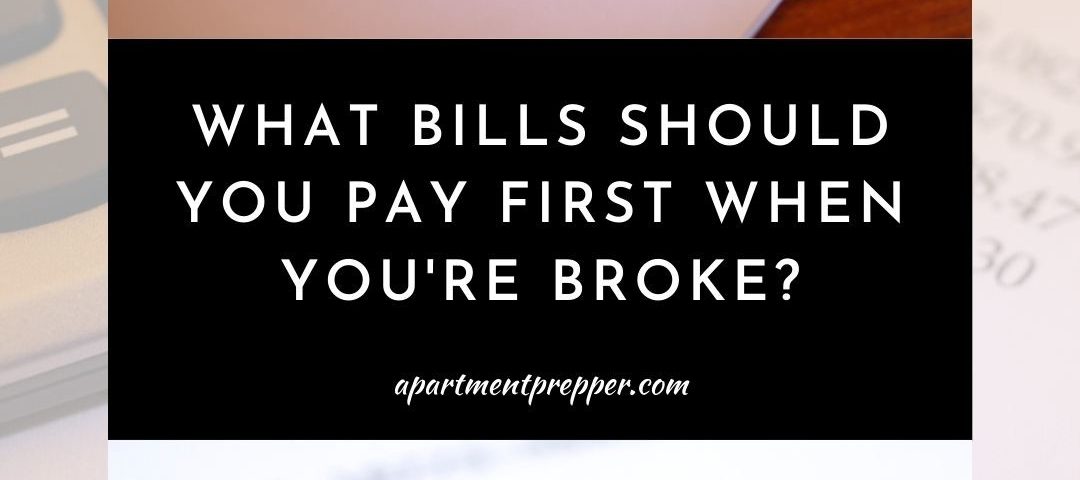Although the unemployment numbers are lower than the previous months, as I write this post, 13.6 million Americans are reported to be unemployed according to the U.S. Bureau of Labor Statistics. Businesses have continue to suffer due to COVID-19 cut-backs. There have been longer lines in food banks, as millions of Americans continue to face longer periods of unemployment.
I have been laid off a few times myself and I know how devastating it can be. It is hard to figure out who to pay first, when you know you don’t have enough to pay everyone.
Who should you pay first? Today we have a special post, excerpted with permission from Daisy Luther’s new book, Lifestyles of the Flat Broke and Resilient.
What Bills Should You Pay First?
Prioritize your payments
The advice I have may not be popular, but let’s talk about prioritizing your
payments when you can’t pay your bills. I am not promoting irresponsibility here.
It’s just math.
When you have less money coming in than you have obligated to go out,
you will not be able to pay all of your bills.
It’s that simple.
You must prioritize. I know that you want to pay every single bill but that may not
be possible right now. When you get your feet back on the ground, you can set up
payment plans for the things you had to set aside while you were busy trying to
survive.
This list of priorities assumes that you have some money coming in, but not
enough to meet your obligations. You simply have to choose survival. I suggest
the following order of payments. In Part Three of the book there is more detailed
advice on each of these categories.
1.) Pay for shelter first
Your number one priority is keeping a roof over your head. That roof may not be
the roof of the house you are in now, though, if your circumstances have changed
and you can no longer afford it. If you can still manage to pay your
rent/mortgage, do so in order to keep your family housed.
If you rent, and your rent is a reasonable price, make this the first payment you
make from your limited funds. You really, truly don’t want to be homeless and
moving is expensive. Try your best to stay put.
If you own, consider your property taxes and insurance as part of your mortgage,
because if you stop paying any of these, your home will be foreclosed on.
If you cannot afford your home payments, you may have to let your home go into
foreclosure, or you may have to be evicted.
Should we all pay the bills that we have promised to pay? Of course, we should.
Our word is very important. Remember, though, that the information here is for
people who are in a position in which they DO NOT HAVE THE MONEY TO PAY.
So, the bottom line is this:
Either pay your housing costs or put aside money for future housing as
your first expenditure.
2.) Buy food
You have to eat, and so do your children. If you don’t eat, you’ll get sick, and then
your situation will be even more dire. Don’t skip meals to stretch your food
further. You need your health and your strength to overcome this situation.
Stick to simple, wholesome basics and cook from scratch. Beans and rice have fed
many a family. In a worst-case scenario, food banks are an option as well. They’re
there for this very situation, for people in your shoes. Those donating genuinely
want to help. Don’t let your pride get in the way. You can find more information
on food coming up in the next section.
3.) Pay for essential utilities
You should be cutting your utility usage to the bare minimum and using every
trick in the book to keep your bills as low as possible.
If your utilities get shut off, it’s going to be difficult to cook from scratch and you
won’t be able to keep leftovers from spoiling. You need the water running from
your taps to drink, cook with, and clean. Depending on the climate and the
season, heat may be vital as well.
If you can’t pay the entire bill, then call the utility companies and try to make
payment arrangements. If your utilities are shut off, then you will have a hefty
reconnection fee on top of the bill. In some locations, you can run into trouble if
you just decide to let your utilities be shut off. You could have problems with the
city or even children’s protective services.
4.) Pay for car/work necessities
What must you have in order to keep working? For me, it’s the internet, since I
work online. All of my business associates contact me via email and the work I do
requires that I be able to access the internet to publish and research things
online. Driving to the library on a daily basis isn’t feasible, as it would reduce the
number of hours I could work.
For another person, this necessity might be different – it could be the cost of
public transit or keeping their vehicle on the road so that they can get to
work. Choose the least expensive options to keep yourself working but maintain
your job-related necessities. We’ll talk about transportation in more detail in the
next section.
5.) Pay for anything else
After you’ve paid all of the above and only then, if you have money left over, now
is the time to pay your other expenses. These expenses include debt that you’ve
incurred, contracts you are involved in (like cell phone plans, etc.) Choose very
carefully how you dole out any remaining money.
Keep one phone going – the one with the lowest possible payment. This is
necessary for work, for your children or their school to contact you in the event of
an emergency, and as a contact point for your financial situation. Compare the
cost of a cell phone, landline, or VOIP phone. (That’s a voice over IP service like
Skype, What’sApp, or Viber) Every family member does not require a phone – you
just need one. (I actually did go for a couple of years with no phone at all, but I’m
uniquely antisocial and had email by which I could be reached.)
If it’s at all possible, try to use the snowball method made famous by Dave
Ramsey to pay off your debts and bail yourself out of your situation. Being free
from debt will allow you to live a much freer life in the future. Keep in mind that
paying off debt is not always a primary goal in bad times. (More on that in this
section) If paying off debt is not possible, try to make the minimum payments.
If the minimum payments are not possible, you may have to default, at least
temporarily, on debts.
Tip: Buy some pantry staples.
If you can add some extra rice or cans of tomatoes to
the pantry, it will help see you through this tight situation.
Be relentless in deciding what will be paid and what will not. This is not the time
for arguments like, “But it’s our only form of entertainment” or “We deserve this
one luxury.”
Cut all non-essentials until things improve.
Focus on the most frugal options possible.
Excerpted from: Lifestyles of the Flat Broke and Resilient by Daisy Luther
About the book:
Lifestyles of the Flat Broke and Resilient was written for people who are going through a desperate time in their finances.
This not just a frugal living book. The book goes on give you tips on how to negotiate with creditors, what to do about housing, how to handle those persistent bill collectors and many more topics. She also discusses how to break the news to your family and how to survive day to day when you are not sure when your next meal is coming from.
This book is one you will use to help you get through a time when you don’t have money to put food on the table or to pay your rent. I wish I had this book back in my own dark financial times. As I read the book, there were times I shook my head and told myself, “I sure wish I had known that during my broke times, it would have saved me a lot of agonizing.” The author includes her own personal stories when she hit financial rock bottom herself. The good news is, though difficult, she pulled herself out and so can you. At just $7.49, this book is worth every penny.

I received a copy of this book but am not financially affiliated with the book publisher. All opinions expressed about this book are mine alone.



holy cow, this! so much this! thank you! much of it i’m already doing, and boy was it validating to see i’m not only not alone but also on the right track. thank you for addressing this important subject, and for the book. if i had a lil more change, i’d buy that one! i hope more people recognize this very serious challenge that many of us were facing even before the pandemic. you don’t need to be an addict, abused, mentally challenged or unemployed to face poverty. everyone i know is one cheque away from being homeless. so thank you for showing people the way, and for making it clear this isn’t about touchy feely do-good-feel-good things. i’m a very positive person but this? this was the kind of advice i needed <3 <3 <3 thank you for helping us keep our chins up!
Hi Krysty, Glad you like that article, and I appreciate you letting me know. So many people are financially challenged right now so you are not alone. I will try to post more articles on this. Thank you!